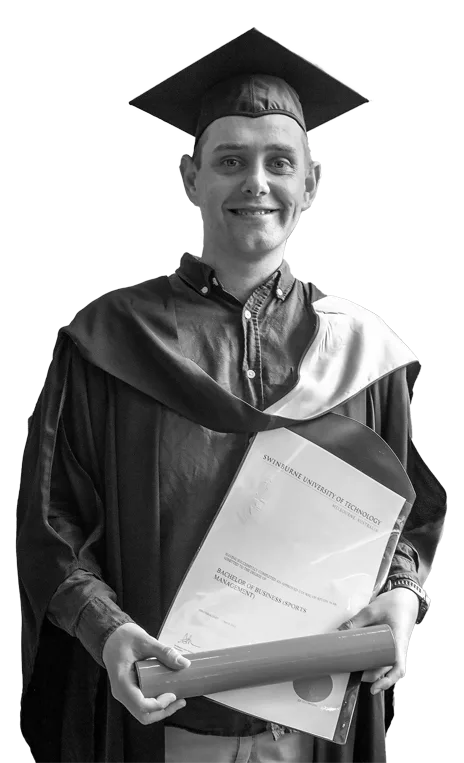100% Online
Graduate Diploma of Psychology (Advanced)
Take the next step in your psychology career with a Graduate Diploma of Psychology (Advanced).
Postgraduate
Qualification
16 months full-time
Duration
Mar, Jul, Nov
Start Date
7
Units
100% Online
Learning Mode
$29,680*
Fees

‘The flexibility to study at my own pace and my own time was perfect and allowed me to finish my degree in around three years, using every [teaching period] I could.’
Jacob, Swinburne Online graduate
13.3% ▴
Careers in psychology will be in high demand in the future, with a 13.3% increase expected in the next five years.

We’re ranked 24th for the Young University Rankings 2024 – a list the world’s best universities that are 50 years old or younger.
This course is accredited by the Australian Psychology Accreditation Council (APAC).
Becoming a registered psychologist in Australia is a rewarding undertaking that will take at least five years of study, depending on the pathway you take. This typically includes a three-year undergraduate psychology sequence; a fourth year of psychology studies; and one or two years of postgraduate study with supervised workplace experience.
Our Graduate Diploma of Psychology (Advanced) is the next step, after completing an APAC approved Level one program of study, for those pursuing a career as a psychologist. Successful completion of the Graduate Diploma of Psychology (Advanced) will fulfil the fourth-year study requirement for those seeking provisional registration as a practising psychologist.
To qualify for entry, you need to have already completed an APAC accredited Level 1 Program OR have completed a Graduate Diploma of Psychology, which serves as a bridging course for students who have completed an unrelated bachelor degree.
The Graduate Diploma of Psychology (Advanced) is a fully online course, in which you will learn to recognise and interpret how the practice of psychology is influenced by varied social, historical, professional and cultural contexts. You will develop a nuanced understanding of ethical issues in psychological practice, and how to apply an evidence-based approach to psychological intervention.
Completion of this course will lead to job opportunities in the mental health sector, including counselling, psychological research, and social work. You will also have the opportunity to apply for provisional registration with APAC if you are successful in enrolling into two years of study and/or supervised professional practice to attain general registration.
You can find out more information about pathways to general registration in psychology on the Australian Psychological Society or APAC website.
What will you learn?
- Research: Learn advanced research and analytical skills that will form the basis of your ongoing professional development, allowing you to critically investigate a range of research topics that inform your professional practice.
- Conceptual Understanding: Cultivate a comprehensive theoretical knowledge of core areas of psychological enquiry, including: cognitive, behavioural, developmental, social and clinical methodologies.
- Problem-Solving: Apply psychological theories, research findings, and skills to theoretical and practical problems in academic psychology and professional practice.
- Ethical Practice: Develop a nuanced understanding of the ethical responsibilities integral to psychological research and practice.
Want more information?
Fill in your details to receive detailed information regarding:
- Career and industry pathways
- Course information
- How online study works
- Information about course fees and how to apply
Flexible study
Flexible study
What does flexible study mean for me?
Studying at Swinburne Online gives you the freedom to study how it suits you. Decide when and where it fits in with your life and tailor your study journey to your own needs. Get a world-class degree without giving up what’s important.
Flexible study at Swinburne Online
Personalised study journey
Set a study pace that work with what’s going on in your life. If you’re unsure about how much you can commit to, we can offer part-time options and the option of increasing your unit load as your progress. Interested in fast-tracking your studies? You also have the opportunity to complete up to 12 units per year.
Fit study around your life
You don’t have to put your life on hold to study. Prioritise what matters to you and fit study around family, work and personal commitments through a course that is flexibly designed for online learners.
Multiple intakes
Start when it suits. Swinburne Online offers multiple intake dates and flexible unit availability, so you can choose when you begin your studies or if you need to take a break.
7-day support
Flexible study requires flexible support. As a Swinburne Online student, you’ll have support for extended hours, seven days a week. Student Advisors available to help with anything from tech support to research advice, and dedicated online tutors in each of your units.
Structure
Structure
Your course structure
The Graduate Diploma of Psychology (Advanced) consists of seven units, including four core units and three major units that can be completed over 16 months part-time (2 units per teaching period).
Your graduate diploma will focus on arming you with skills in various counselling methodologies in workplace-focused units like ‘Counselling and Interventions’. You will also explore a number of major therapeutic approaches, which will ultimately inform your own psychological practice, including psychoanalytic, existential, behavioural, cognitive, family and solution-focused therapy
Why study a degree in psychology with Swinburne Online? Our courses are at the forefront of industry and provide you with the practical skills to success come graduation. View all units in this graduate diploma.
View All UnitsHow you'll learn
How you'll learn
Learning designed for online
Your study journey with Swinburne Online is tailored to the digital space. You’ll study in a dynamic virtual classroom environment and interact with your peers in the custom-built social platform. You will also receive support at the times you need it from advisors who understand studying online.
Online classroom
You’ll complete each of your units in Canvas, your online classroom, and be guided through coursework by an online tutor with real-world experience in your field of study. Canvas is where you’ll access classes, assignments and discussion boards with your peers.
Online campus
The Student Hub is your online campus, where you’ll access the support and resources to assist you throughout your study journey. From managing your course to technical support and library resources, you’ll find it all in one easy location.
Tailored support
Swinburne Online will be there for you each step of the way. From enrolment through to graduation, we offer extended, flexible support in each of your units and advisors to assist with any queries.
Entry requirements
Entry requirements
Entry requirements
To be eligible to apply, Australian applicants must have completed an APAC-accredited three-year or equivalent sequence in psychology. Students must achieve a minimum of a Distinction average (70%) in core psychology units at the third-year level.
Applicants who have completed a psychology major at an overseas university MUST provide evidence that their degree meets the requirements of an APAC-accredited Australian undergraduate degree in psychology.
Students admitted to the course with prior tertiary studies that satisfy part of the academic requirements of this course may be eligible for academic credit and will be considered on a case-by-case basis.
The University may determine selection criteria and restrictions in respect of courses to apply in addition to these entry requirements.
Eligibility for Aboriginal and Torres Strait Islander students
Consistent with the mission of the Australian Psychological Society and the Australian Indigenous Psychology Education Project, Swinburne is committed to increasing the number of Aboriginal and Torres Strait Islander psychologists and to delivering culturally safe training programs.
Aboriginal and Torres Strait Islander people who are interested in Graduate Diploma of Psychology (Advanced) are encouraged to contact the Moondani Toombadool Centre (indigenousstudents@swin.edu.au) and the course directors Dr. James Williams (jwilliams@swin.edu.au) and Dr. Pui Tzan Chan (puichan@swin.edu.au) to discuss their application and to explore the supports available during their candidature at Swinburne.
English language requirements
- IELTS (Academic Module): Overall 7.0 with no individual band below 7.0
- Swinburne English Language Centre: EAP 5 Advanced level with overall 75% and all skills 70% or above
- TOEFL iBT: minimum score 95 (Reading no less than 20, Writing no less than 22)
- Or equivalent measures available here.
Fees
Fees
The estimated annual fee for this course is $29,680*. This is based on completing seven 12.5 credit point units in one calendar year.
*Unit fees are subject to change annually.
Commonwealth provided loans are available to assist eligible students to pay their course fees and there are a range of university, government and privately funded scholarships and prizes.
Discover more information about HELP loans.
Course fees will be affected by a student’s unit selection and any credit awarded in recognition of previous academic experience.
Domestic students also contribute to student services and amenities via an annual fee.
Please note this course is not available onshore or offshore international students.
Scholarships
Scholarships are available for both commencing and current students. You may be eligible for Swinburne Scholarships.
Career Outcomes
Career Outcomes
Your pathway to becoming a psychologist
With a sufficiently broad focus – and an emphasis on building practical workplace skills through independent research projects – you will gain a unique insight into what field of psychological practice or research you wish to specialise in.
Upon completion graduates will be able to follow one of two pathways to attain provisional registration. This may be in the form of enrolment into an accredited higher degree; or alternatively a fifth year specialist qualification, plus one year of supervised practice.
Family Therapist
Work as part of a treatment team to provide counselling and therapeutic support to families navigating crisis, who in many cases have experienced significant disadvantage.
Mental Health Support Worker
Become an essential part of the mental health support network and specialise in assisting people with a variety of complex needs.
Human Resources Coordinator
Apply psychological research and analysis in a human resources context, creating positive workspaces that increase employee well-being and drive higher employee engagement.
Researcher
Delve into diverse topics with a research study. Research may include collating sources such as internet searchers, newspapers, journals and other publications to assist in your specific area of focus.
Research Assistant
Provide support to research teams who are conducting experiments or gathering and analysing data. Duties may include assisting with study design, data collection and management, and data analysis.
Client Relationship Officer
Build strong client relationships and guide clients in reaching their goals by identifying and resolving possible issues around their mental health. Working as part of a team, onboard new clients, manage caseloads and escalate certain cases to different team members.
Testimonial
‘This course will allow me to find more than just a job; it will enable me to keep pursuing my passion of working more comprehensively in the field of human behaviour and further understand the complexities that this area presents.’
Jola
Swinburne Online graduate
